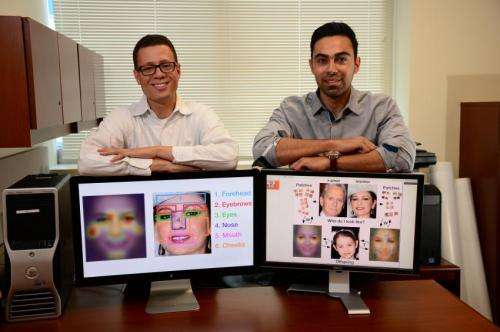Who's your daddy? Researchers program computer to find out

A University of Central Florida research team has developed a facial recognition tool that promises to be useful in rapidly matching pictures of children with their biological parents and in potentially identifying photos of missing children as they age.
The work verifies that a computer is capable of matching pictures of parents and their children. The study will be presented at the nation's premier event for the science of computer vision - the IEEE Computer Vision and Pattern Recognition conference in Columbus, Ohio, which begins Monday, June 23. Graduate Student Afshin Dehfghan and a team from UCF's Center for Research in Computer Vision started the project with more than 10,000 online images of celebrities, politicians and their children.
"We wanted to see whether a machine could answer questions, such as 'Do children resemble their parents?' 'Do children resemble one parent more than another?' and 'What parts of the face are more genetically inspired?'" he said.
Anthropologists have typically studied these questions. However Dehghan and his team are advancing a new wave of computational science that uses the power of a mechanical "mind" to evaluate data completely objectively – without the clutter of subjective human emotions and biases.
The tool could be useful to law enforcement and families in locating missing children.
"As this tool is developed I could see it being used to identify long-time missing children as they mature," said Ross Wolf, associate professor of criminal justice at UCF.
Wolf said that facial recognition technology is already heavily used by law enforcement, but that it has not been developed to the point where it can identify the same characteristics in photos over time, something this technology could have the capability to do. Dehghan said he is planning to expand on the work in that area by studying how factors such as age and ethnicity affect the resemblance of facial features.
The project is the latest entry by UCF students into a scientific debate that has lived on for more than 60 years – can computers think? Dehghan, who remembers being fascinated by a free-thinking robot in the movie The Terminator as he was growing up, says the project shows that computers can "deep think" by building on previous knowledge. While humans might look for something as prominent as actress Catherine Zeta Jones's smile in her offspring, the computer is able to focus on indicators people may not find as significant – such as
the left eye, the chin and parts of the forehead. By designing an algorithm to focus on specific features, the research team converted the photos into a checkerboard of patches and extracted tiny snapshots of the most significant facial parts.
The computer compared all the photos feature by feature and sorted them by the most probable match. The team found that its program not only did a better job of matching features of parents and their kids than random chance, but it also outperformed existing software for identifying relatives through photos by 3 to 10 percent. The study affirmed that children resemble their parents, often in unseen ways, but that in the majority of cases (63 percent) sons resemble their fathers more than their mothers, and daughters are more likely to resemble their mothers (82 percent).
"Machines can learn through time," Dehghan said. "When a computer goes through thousands of images it knows what it has seen and is able to tell you." Technology has grown to the point that computer scientists are able to revisit findings from traditional science fields and expand on them, said Mubarak Shah, one of the world's leading authorities in the emerging field of computer vision and director of the UCF center.
Shah, who advised Dehghan and his colleagues on the project, said the technology could also be useful in areas such as homeland security, where authorities can use the technology to determine relationships between terrorists.
Provided by University of Central Florida





















